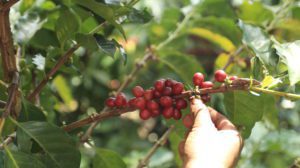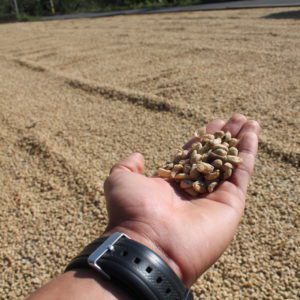The coffee industry has experienced hardships in the past few years. Between the pandemic, prolonged supply chain issues and the war in Ukraine, disruptions and changes have been plentiful. Nevertheless, growth has continued. The world loves its coffee. Looking at the state of the coffee industry today is interesting considering recent challenges and rising passion for coffee.
General Coffee Industry

Those unfamiliar with the coffee industry will delight in a brief explanation of how it’s organized and its characteristics. The links in the chain that bring coffee to consumers begin with coffee plant growth in or near the coffee belt. Coffee doesn’t grow well at all latitudes. Equatorial countries produce the bulk of the world’s coffee. However, it gets shipped to the far reaches of the globe. So, when the term “coffee industry” is used, bear in mind that coffee is grown in many countries that are not fully developed. Many coffee farms are small or simple operations, contrasting with the term “industry,” which describes the overall trade. There are positives to these small operations, including the fact that it provides an opportunity for individuals to care for plants in a way that’s no longer possible with the enormous agribusiness operations present in the US and other developed countries.
Despite coffee’s origins along the equator, some of the northernmost latitudes consume the most coffee per person—Scandinavia, the rest of Northern Europe and Canada. However, people who have access to coffee products on every continent drink it. There isn’t a lot of data for Antarctica, of course, although steaming coffee might help with the cold!
Organization
Over the past decade, coffee has been shaped into several new forms, as in different ways to brew and drink it. Coffee already appeared in a few forms to start with, like ground and whole bean. Such forms are categories that make up the coffee market. Another division is instant. Simple and easy folks, along with wilderness campers, love their instant coffee.
In the past decade, single-serve pods and capsules have allowed everybody at the office to have coffee their way. Cold brews and cold pre-mixed coffees have livened things up regardless of the temperature. Recently, coffee bags like those for brewing tea have surfaced.
The coffee industry also distinguishes between on-trade and off-trade. On-trade refers to when consumers drink the coffee in the same location, like a restaurant and coffee shop. Meanwhile, off-trade is the term for stores like supermarkets and special retailers. Coffee distributors may need to approach these spots differently. Meanwhile, in North America, it’s growing more popular to order directly from the internet from smaller, more careful, ethical and sustainable coffee producers.
Certifications Changing the Coffee Industry
Continuing further in that direction, certifications and labels have become big factors by which consumers are changing the flow of the coffee trade in many areas. It seems the organization of the coffee market will continue to be affected. An important certification in the western hemisphere is Rainforest Alliance Certification. Coffee grows well in and near the rainforest in Central America, the Caribbean and South America. Therefore, protecting the rainforest and its plants and animals is a priority. Consumers in far-away countries are joining locals’ ecosystem protection efforts by purchasing responsibly. In addition to sustainability, Rainforest Alliance Certification also verifies an organization prioritizes human rights and economic responsibility. Overall, this certification condones responsibility and avoids exploitation.
Other Coffee Certifications
Other certifications are affecting change in the coffee industry. UTZ is a certification similar to the Rainforest Alliance that has now merged into it. USDA Organic Certification helps verify the coffee’s genetic makeup and the care of the plant. Many coffee producers do take shortcuts. Decaf is one segment of the industry where decaffeination methods can involve chemicals.
Meanwhile, a Fair Trade label certifies that people in the chain of trade who are planting, growing and shipping the coffee were treated well. However, beware Fair Trade designations that were not assessed by a neutral party. Some coffee companies or businesses just print “Fair Trade on their bag. Additional certifications for coffee exist beyond Rainforest Alliance, Organic and Fair Trade designations.
State of the Coffee Industry – Disruptions and Changes
Coffee During the Pandemic
While most industries experienced disruptions, those based in agriculture weren’t always as affected. As is imaginable, social distancing during the first steps of a bean’s journey, farming and processing, isn’t terribly difficult. Brazil, the world’s largest coffee producer, actually had the most voluminous growth year ever in 2020 and 2021 according to the BBC. Honduras’ coffee production is actually ranking among the top coffee-producing countries.
During the pandemic, many people transitioned to purchasing more coffee for home brewing. With less consumption at coffee shops, cafés and work, this made sense. It was also a way to take a break from work at home, gear up for home improvement or supercharge deep-cleaning projects.
One big problem during the pandemic was that green coffee transport needs to be scheduled well ahead of time. In 2020 and 2021, with logistics disruptions, this became tricky. Containers became stuck at ports when they couldn’t be unloaded. Green coffee needs to be transported with humidity considerations, adding another layer of hurdles.
E-Commerce Altered the Coffee Industry

Since the pandemic led many people to order groceries online, they’ve gotten more accustomed to ordering and picking up or having items delivered. Online coffee sales with a subscription have increased 109% since 2019.
The online growth isn’t surprising for coffee compared to other food items. One reason online sales have climbed is that North Americans, and other people living far from the equator, can’t buy coffee locally. Therefore, conscientious consumers like to pick out the location. The growth conditions and the conditions of the chain of trade matter too.
Another factor boosting online sales is that many coffee aficionados, or just adventurous people, like to try different coffees. Nowadays, there are more gustatory enthusiasts, as in people who like to try different international foods, wines, beers, cheeses and coffees. Of course, free time and funds are a factor that can inhibit following one’s taste curiosity. However, with expanded international shipping and rising enthusiasm, many people can try exotic coffees. Some even arrive at lower prices.
Coffee has been offered under a subscription model for some time. People who order coffee online and have it delivered regularly can expand their range. They no longer need to limit themselves to the coffee offered at their local grocery store. They need not stop at a specialty store or coffee shop to get delicious or interesting coffee either. Carrying on with their busy lives and letting the arrival of exotic coffee puncture the monotony is possible. Or their favorite coffee can be set on their doorstep without the shopping hassle and several rounds of price markup. This is the wonder of online coffee shopping and subscription models!
A Subscription to Taste and Cause
It’s an advantage nowadays to be able to select food items from far off and have them shipped. A true luxury is having delectable coffee that supports a good cause arrive regularly. Subida Coffee Co. offers a single-origin coffee that supports a non-profit. In Santa Rosa de Copán, Honduras, a 120-acre farm called the Moses Project grows coffee. It also educates teenagers who may not be able to continue high school otherwise. For the coffee sales, 100% of the profits flow toward charity work. Best of all, in Honduras, Copán coffee is among the tastiest coffees in Central America.

